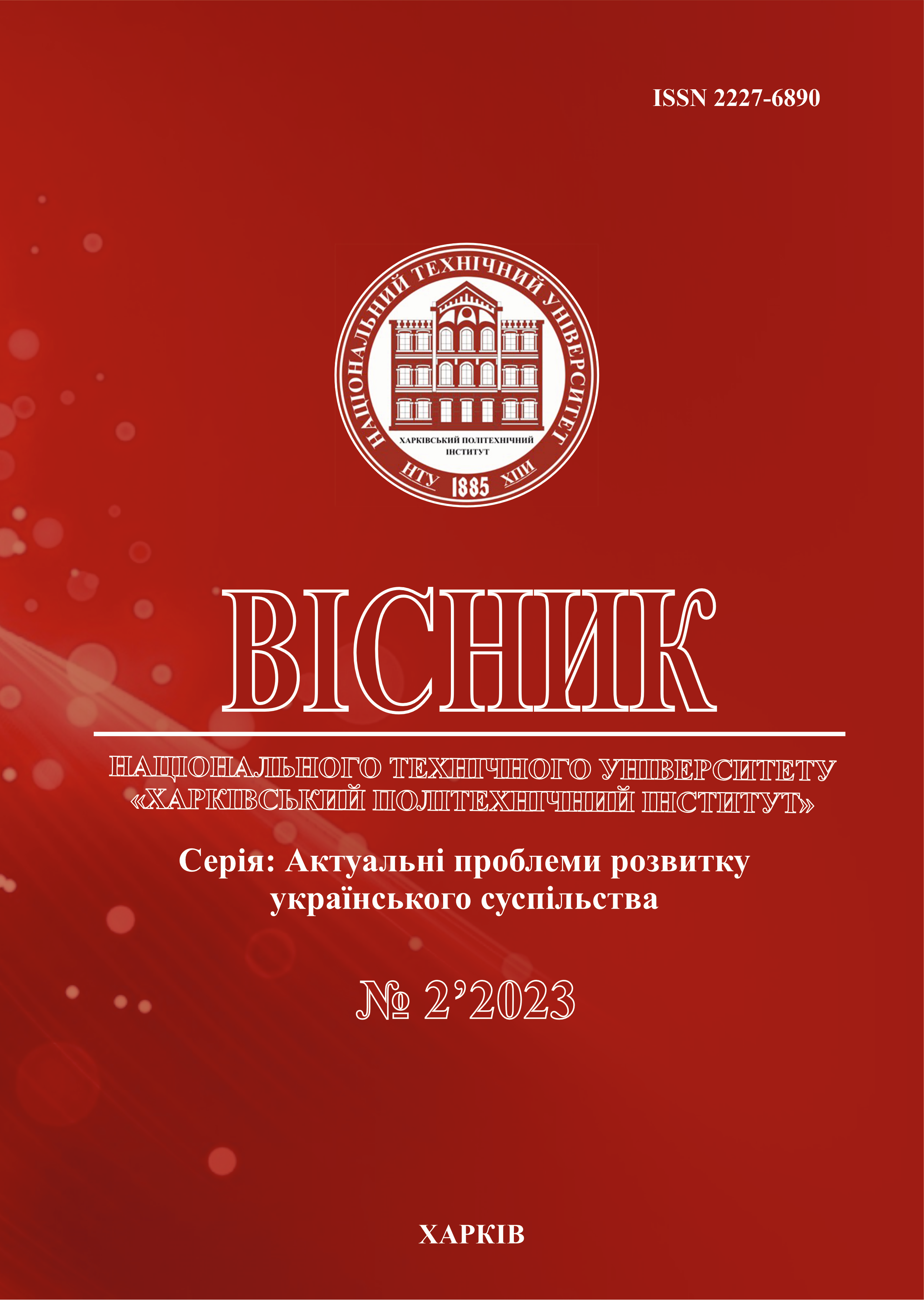ВЗАЄМОЗВ'ЯЗОК ТЕХНОЛОГІЧНОЇ ТА ІНТЕЛЕКТУАЛЬНОЇ ТРАНСФОРМАЦІЇ СУЧАСНОЇ ЦИВІЛІЗАЦІЇ
DOI:
https://doi.org/10.20998/2227-6890.2023.2.07Ключові слова:
технологія, інформація, інформаційна технологія, інформаційне суспільство, цивілізації, технологічні цивілізації, інтелектуальні цивілізації, інтелектуальний капітал, трансформація, синергетичний підхід, сталий/стійкий розвитокАнотація
У статті розглядається особливості та взаємозв’язок між технологічною та інтелектуальною цивілізаціями. Аналізуються ключові аспекти впливу технологій на інтелектуальний розвиток суспільства та його культурно-історичні наслідки. Доведено, що концепція трансформації передбачає, що процес спрямований на досягнення більш високого рівня розвитку в рамках існуючих еколого-економічних відносин. Аналізується взаємодія технологічних інновацій та інтелектуальних змін у різних сферах життя та висвітлюються майбутні перспективи в цьому контексті.
Посилання
Beilin M.V., Zheltoborodov O.M. (2022). Man in the conditions of the cognitive-technological anthroposphere, Current problems of philosophy and sociology. DOI: https://doi.org/10.32782/apfs.v039.2022.1
Don B., Jones T., Vilion R., Solonin S., Larsen T. (2019). Spiral dynamics in practice. A model of personality, organization and human development. Print 2. P. 344.
Vetrynskyi I.M. (2019). Variability of approaches to defining the category "civilization" in modern scientific discourse. Historical development of civilizations in the context of globalization: value dimension: monograph ; edited by Doctor of Political Sciences, Professor O.V. Zernetska. Kyiv: State University "Institute of World History of the National Academy of Sciences of Ukraine". P. 8-20.
Voronov I.O. (2021). Causal relationship between the informatization of society and crimes in the field of high information technologies. Legal Scientific Electronic Journal. № 8. P. 388-391
Godz N.B. (2018). The question of the future and the transformation of environmental problems in the light of resource reduction for the prevention of global military conflicts. World conflicts in the 21st century: philosophical reflection of social, economic, ecological, political and religious aspects: Materials of the International Scientific and Practical Conference (October 25, 2018, Kyiv) ; Composers : B.V. Novikov, I. Pokulita .K, Kazakov M.A. Kyiv : LLC NVP "Interservice". 145 p., P. 18-20.
Grynko P.L. (2020). Formation of the information system of the organization in the conditions of the digital economy. International journal of innovative technologies in economy. № 1 (28). Retrieved from https://rsglobal.pl/index.php/ijite/article/view/322
Captain S.V., Mostipaka Fr. V. (2018). Conceptual foundations of the development of information and knowledge society. Economics and management of the national economy. Eastern Europe: economy, business and management. Vol. 4 (15). P. 81-85.
Kryvda O.V. (2020). The fourth industrial revolution and digital transformations. Business, innovations, management: problems and prospects: materials of the 1st International Scientific and Practical Conference, Kyiv, April 23-26, 2020. K. : KPI named after Igor Sikorskyi, 2020. P. 48-49.
Lytvynchuk I.L. (2013). Intellectual activity in the paradigm of civilizational development of society. Education and science in Ukraine: materials Vseukr. of science conference, June 21–22. 2013. Dnipropetrovsk : Royal Print, Part 1. P. 235–236.
Lyashenko V.I., Kotov E.V. (2015), Ukraine XXI: neo-industrial state or "project collapse"? : Monograph; National Academy of Sciences of Ukraine, Institute of Industrial Economics; Poltava University of Economics and Trade. Kyiv. 196 p.
Mishchenko V.I., Shimchenko O.V. (2023). Artificial intelligence in the destiny of man: a view from the future, National Technical University "Kharkiv Polytechnic Institute", Kharkiv, Ukraine.
Pozhev V.I. (2008). Information technologies as a factor in the formation of an information society, Humanitarian Gazette ZDIA, Zaporizhzhia, Retrieved from https://old-zdia.znu.edu.ua/gazeta/visnik_33_4.pdf
Sydorenko L.I. (2002). Modern ecology: scientific, ethical and philosophical perspectives., Educational manual. Kyiv. Retrieved from http://www.philsci.univ.kiev.ua/biblio/Cidorenko/Cid-ekol- 5.html
Stashkevich O.O. (2015). Genealogy of intellectual civilization. Retrieved from http://enpuir.npu.edu.ua/handle/123456789/10816
Tararoev Ya.V. (2006). Man and the universe: the problem of interconnection. Epistemology and philosophy of science. T. 9. № 3. P. 124-138.
Firsova, O.D. (2013). Information technologies as a factor of social transformation of society. Public administration: improvement and development №. 9
Shubaly O. (2016). Theoretical foundations of the transformation of the system of ecological and economic relations according to the synergistic approach, Economics of nature use and environmental protection, p. 53-60. Retrieved from http://nbuv.gov.ua/UJRN/epod_2016_2016_9
Chamara I.M. Intellectualization of labor as the most important condition of economic development. Retrieved from www.experts.in.ua/baza/analytic/index.php?ELEMENT_ID=10927
Toffler A. (May 1, 1984). The Third Wave; Bantam P. 560.

